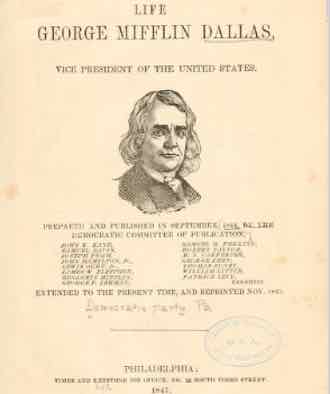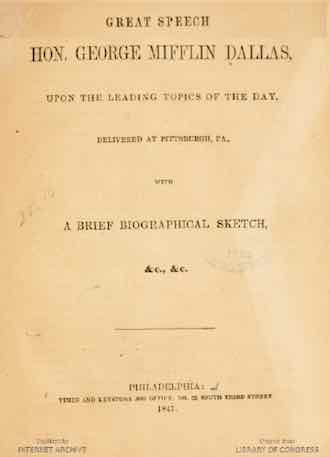By Lee Cary ——Bio and Archives--September 8, 2017
American Politics, News | CFP Comments | Reader Friendly | Subscribe | Email Us
 Throughout his political career, Dallas believed in popular sovereignty regarding states' rights. To him that meant, until the Constitution was amended, each state had the right to decide the slavery issue for itself.
The "Life of George Mifflin Dallas, Vice President of the United States" was originally prepared in September 1844, by the Democrat Committee of Publication, and then revised in November 1847. Quotes from Dallas within the publication document his understanding of popular sovereignty applied to the issue of slavery in new territories.
A debate, following the war with Mexico, raged between those who believed the federal government should designate which new territories, gained after the war, should be free and which should be slave.
Dallas: The Series
Part 1: Will Dallas join the 2017 Great Purge of American History?
Part 2: Who was George Mifflin Dallas in American History?
Part 3: Life of George Mifflin Dallas, Vice President of the United States
Part 4: City of Dallas is named after a Democrat Party politician whose support for the Fugitive Slave Act
Part 5: Dallas praised Pennsylvania's denunciation of slavery in 1835
Part 6: Will Dallas join the 2017 Great Purge of American History? (Part 6)
Throughout his political career, Dallas believed in popular sovereignty regarding states' rights. To him that meant, until the Constitution was amended, each state had the right to decide the slavery issue for itself.
The "Life of George Mifflin Dallas, Vice President of the United States" was originally prepared in September 1844, by the Democrat Committee of Publication, and then revised in November 1847. Quotes from Dallas within the publication document his understanding of popular sovereignty applied to the issue of slavery in new territories.
A debate, following the war with Mexico, raged between those who believed the federal government should designate which new territories, gained after the war, should be free and which should be slave.
Dallas: The Series
Part 1: Will Dallas join the 2017 Great Purge of American History?
Part 2: Who was George Mifflin Dallas in American History?
Part 3: Life of George Mifflin Dallas, Vice President of the United States
Part 4: City of Dallas is named after a Democrat Party politician whose support for the Fugitive Slave Act
Part 5: Dallas praised Pennsylvania's denunciation of slavery in 1835
Part 6: Will Dallas join the 2017 Great Purge of American History? (Part 6)"Freemen themselves, in spirit and by inheritance, and unwilling to permit the extension of slavery to regions in which it is not now tolerated, they would have Congress declare beforehand that there shall never be slaves on the soil which we obtain from Mexico. Others equally fervent with these, protest that this is a household subject, and excluded by the terms of the Constitution from the sphere of Federal legislation--that while the President and Congress have charge of the foreign relations of all the States, making war, regulating commerce and collecting duties on imports for national objects, the Constitution has expressly reserved to the people of each State the right of determining for themselves upon all other matters of legislation whatsoever; that in our free and equal confederacy, there can be no inequality of rights between the States of which it is made up; that Louisiana and Missouri have just the same powers within their own borders as Massachusetts and New York; and they add, that if California or New Mexico shall hereafter be adjoined to the Union, it will be for the people of those States, as it is now for the people of Pennsylvania and Virginia, to decide the question of slavery for themselves." (pp. 17-18, with bolding added)Dallas supported the popular-sovereignty side of the debate as that position supported by the U.S. Constitution. He did not believe Constitution gave the federal government authority to designate which new territories would allow slavery, or which would prohibit it. The decision, according to Dallas, Constitutionally rested with the residents of each territory.
"Sir, to my mind, the whole character of the Constitution must be changed before you can discern in it a communication, express or implied, of a power to Congress, to mould, modify, change, establish, or prohibit, actually or prospectively, the domestic relations of any portion of the American people. Such a power rests with the people themselves alone: it is the vitality and inalienable right of self-government. I cannot yield my assent to the broad pretension that ‘the power to dispose of and make all needful rules and regulation's respecting the territory, or other property, belonging to the United States'--a power given by the Constitution to Congress--involves any authority whatever to deprive the people of territories of every right, and subject them absolutely to the will of the majority of that body. This constitutional clause bears solely upon property, upon naked land. If the territory be tenanted by men, and especially if those men have already their civil institutions and their domestic relations, and, still more strongly, if that territory has come to us, covered with established societies, by conquest or purchase, I cannot for an instant indulge the extravagant construction of this article, which would empower Congress to extinguish the privilege of self-government, and to do precisely with the local communities what it pleased. At that rate, we might, one of these days, be shocked by an act of Congress formally establishing slavery among a people who disclaimed or excluded it;--for if this clause of the Constitution impart any power to prohibit, it equally imparts the power to originate and legalize." (p. 20) (italics in original)
Support Canada Free Press


"A portion of the people of the United States, have their hearts set against the extension of slavery ; and there are scarcely any means which some do not deem justifiable, in order to accomplish their purpose. With a large number, this subject is no doubt a matter of conscience and of principle; and they assume that a certain portion of territory is to be derived from Mexico, as an indemnity for the wrongs done to us, and our expenses in the war. These people say, that if we take this territory, there should be no slavery tolerated within it. To this, another portion of the country object. They say that if we acquire this territory, it will come through the toil and blood of the country in common that of the North and South; and we are not disposed to say that this territory shall be appropriated exclusively to the people in the North.
There is but one political course which a man can take, in safety to his conscience that course is a strict adherence to the Constitution. That is the charter by which to determine our powers. That is the compass by which alone we can safely steer our political barque. If you can accomplish the abolition of slavery in the Southern States through its instrumentality, why do so. But I hope there are none who would do so at the hazard of our Union, liberty and independence. The only true test, however, to which we can submit this question, or any other that may arise, is the Constitution. But it is unfortunately the case, with many of those who seem most interested in the question of abolishing slavery, that they are not much governed by such a principle as this. There is a something above our Constitution, above our laws, above our world itself, that is invoked. These persons should remember, that there is a means by which to accomplish their ends, if they be right, much more safe and sure, than that of destroying the only safeguard which they have for their own liberty. If they be indeed sincere in their designs, let them toil on until they shall be able to effect such a change in the Constitution itself as they desire; but, while that instrument positively prohibits any interference by one State with the institutions of another, I could hope that State pride alone, if there were no more liberal and general principle, would forbid the people of Pennsylvania to interfere with the peculiar affairs of her sister Slates, as readily as she would resent even the appearance of meddling by another State, with affairs especially her own." {snip} The very best thing which can be done, when all is said upon the subject that may be said, will be to let it alone entirely leaving to the people of the territory to be acquired, the business of settling the matter for themselves: for where slavery has no existence, all the legislation of Congress would be powerless to give it existence; and where we find it to exist the people of the country have themselves adopted the institution; they have the right, alone, to determine their own institutions; and, as the matter so exists elsewhere, they are not to be condemned for its existence. " (bolding not in original)Dallas was caught between a rock and a hard place with regard to slavery. While he affirmed the right of individual states to declare as free or slave, he denied the right of secession to any state. He was against both abolition and secession. He firmly believed that, until the Constitution rendered slavery illegal, it was legal. Coming next in Part 4: What position did the antebellum politician, after whom the City of Dallas is named, take concerning the most important legislation concerning slavery between the Revolutionary War and the Civil War?
View Comments